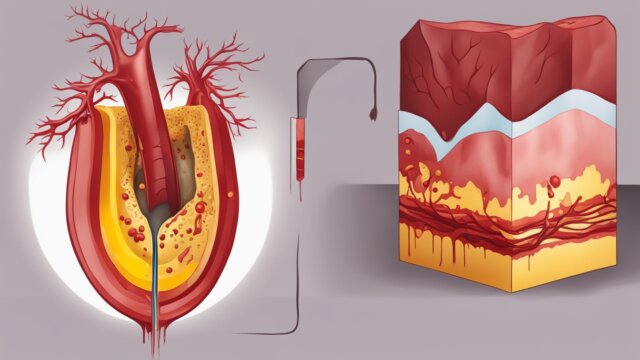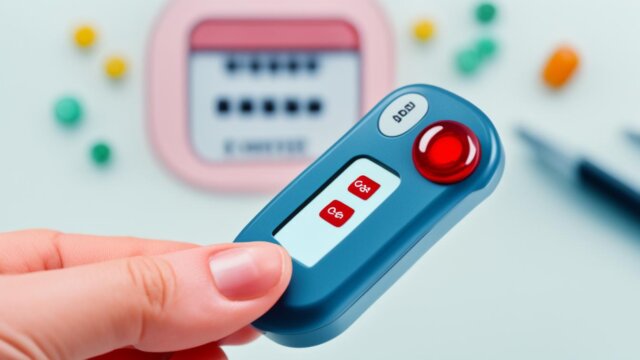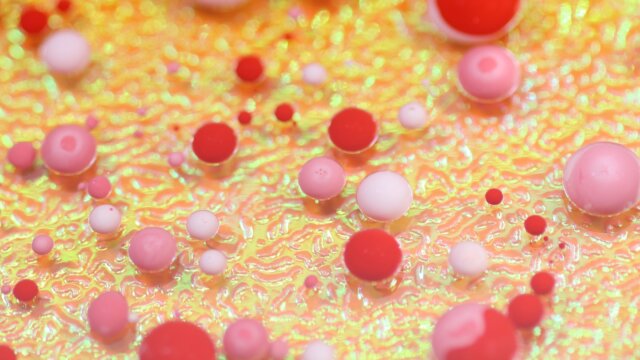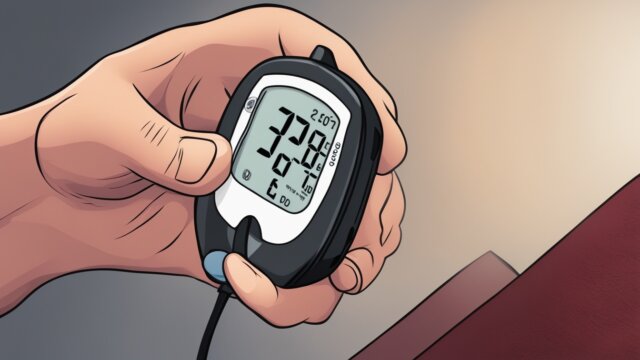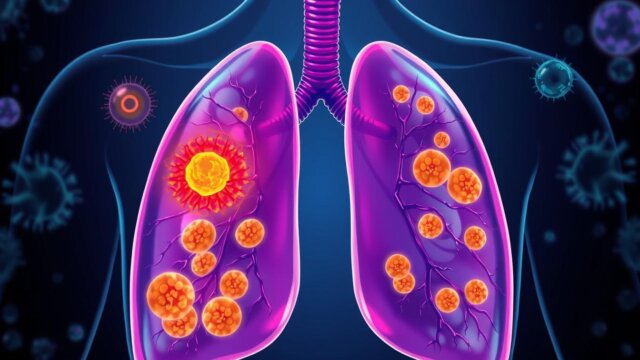FTC disclaimer: This post may contains affiliate links and we will be compensated if you click on a link and make a purchase.
A lot of people in the U.S. deal with heartburn every day. In fact, 1 in 5 people suffer from it. This is because of GERD, a common digestive issue. It happens when the muscle at the top of the stomach doesn’t work right, letting stomach acid flow back up.
This acid can cause irritation and even serious problems if not treated.
Key Takeaways
- GERD is a common digestive disorder affecting up to 1 in 5 Americans daily
- It is caused by a weakened lower esophageal sphincter allowing stomach acid to reflux into the esophagus
- Symptoms include heartburn, regurgitation, difficulty swallowing, and respiratory issues
- Treatment options range from lifestyle changes to medications and surgical procedures
- Prompt medical attention is crucial to prevent complications like esophagitis and Barrett’s esophagus
What is Gastroesophageal Reflux Disease (GERD)?
Definition and Overview
Gastroesophageal reflux disease (GERD) is a chronic condition. It happens when stomach acid flows back into the esophagus. This can irritate the esophagus lining, causing heartburn and trouble swallowing. GERD is a serious and ongoing form of Acid reflux.
How Heartburn and GERD Occur
Acid reflux happens when the muscle at the esophagus and stomach relaxes too much. This lets stomach acid flow back into the esophagus. If this happens often, it can turn into GERD.
The stomach acid can irritate the esophagus lining, causing GERD symptoms.
“About 20% of the population in the United States experiences symptoms of GERD at least once a week.”
GERD affects a lot of people. It’s important to understand how it works to manage and prevent it.
Common Symptoms of GERD
Gastroesophageal Reflux Disease (GERD) is a common condition. It happens when stomach contents flow back into the esophagus. This leads to various symptoms.
The most known symptom is heartburn. It feels like a burning in the chest that goes up to the neck and throat. This happens after eating and gets worse at night or when you lie down.
GERD also causes other symptoms. These include bringing up food or sour liquid, trouble swallowing, hoarseness, chronic cough, laryngitis, and worse asthma symptoms. At night, it can cause a cough, make the vocal cords inflamed (laryngitis), and disrupt sleep.
Heartburn Symptoms
Heartburn is the main symptom of GERD. It’s a burning feeling in the chest that goes up to the neck and throat. This happens after eating and gets worse at night or when you lie down.
People with GERD might also taste something sour or bitter in their mouth. They might have trouble swallowing and chest pain.
Other GERD Symptoms
- Regurgitation of food or sour liquid
- Difficulty swallowing
- Hoarseness
- Chronic cough
- Laryngitis
- Worsening of asthma symptoms
- Disrupted sleep due to nighttime acid reflux
“Chronic acid reflux can lead to a range of uncomfortable and potentially serious symptoms, highlighting the importance of seeking medical attention and managing the condition effectively.”
Causes and Risk Factors of GERD
Gastroesophageal Reflux Disease (GERD) happens when stomach acid flows back into the esophagus. This can cause heartburn, regurgitation, and trouble swallowing. Knowing what causes and risks of GERD helps manage it better.
Hiatal Hernia and GERD
A hiatal hernia is a big risk for GERD. It’s when the stomach bulges into the chest through the diaphragm. This can make the muscle at the stomach’s bottom weak. So, stomach acid can flow back into the esophagus, causing GERD.
GERD and Pregnancy
Many pregnant women get GERD, up to 80% by the third trimester. Hormones during pregnancy relax the muscle that keeps stomach acid down. The growing baby also puts pressure on the stomach, making acid reflux more likely. Pregnant women often have worse GERD symptoms because of these changes.
GERD and Weight
Being overweight or obese raises the risk of GERD. Extra weight, especially around the belly, puts pressure on the stomach. This can push stomach contents back up. Studies show that GERD risk goes up with a higher BMI. Keeping a healthy weight can lessen GERD symptoms.
Other things like connective tissue disorders, slow stomach emptying, and some medicines can also cause GERD. Knowing what causes and risks is key to managing and treating GERD.
“About 20 percent of adults in the U.S. have GERD often, making it a big cause of heartburn and acid reflux.”
Complications of Untreated GERD
If GERD is not treated, it can lead to serious problems. It’s the main cause of esophageal ulcers. About 5% to 10% of people with GERD get a condition called Barrett’s esophagus. This condition can slightly raise the risk of getting esophageal cancer.
GERD can damage the esophagus and cause inflammation, known as esophagitis. This can lead to a narrowed esophagus, called esophageal stricture. Barrett’s esophagus also raises the risk of esophageal cancer, especially if there’s a family history.
Esophageal cancer symptoms may not show up until it’s hard to treat. GERD can also harm tooth enamel, making teeth decay more likely.
“Untreated GERD can lead to serious complications, including esophageal inflammation, Barrett’s esophagus, and an increased risk of esophageal cancer. Seeking prompt medical attention is crucial to prevent these potentially life-threatening issues.”
There are many ways to treat GERD, like changing your lifestyle, taking medicine, or surgery in some cases. Making lifestyle changes, like eating smaller meals and avoiding certain foods, can help. Doctors often prescribe antacids, H2 blockers, and proton pump inhibitors for GERD.
Getting proper treatment for GERD is key to avoiding serious problems and keeping your digestive system healthy. Working closely with your doctor and getting regular check-ups can help manage GERD well over time.
Diagnosing GERD
Doctors use many steps to confirm GERD. They look at symptoms and do tests. The upper endoscopy is a key test. It lets doctors see the upper digestive system.
During an upper endoscopy, a thin tube with a camera goes down the throat. It looks at the esophagus, stomach, and part of the small intestine. Doctors can see if there’s inflammation or damage that might mean GERD.
Upper Endoscopy
Doctors might also suggest other tests for GERD. These include an ambulatory acid (pH) probe test that checks acid levels for 24 hours. An X-ray of the upper digestive system can show if there are any problems like a narrowed esophagus.
Another test is esophageal manometry. It looks at how strong the esophageal muscles are and how they work.
These tests give doctors important info. They help figure out how bad the GERD is and what treatment to use. By looking at all the test results, doctors can make a good plan for each patient.
“Diagnostic tests like upper endoscopy and ambulatory pH monitoring are essential in confirming a GERD diagnosis and guiding treatment decisions.”
Treatment Options for GERD
If lifestyle changes don’t help enough, there are other ways to manage GERD symptoms. These include changing your lifestyle and diet, as well as using medicines.
Lifestyle and Dietary Changes
Changing your lifestyle and diet can ease GERD symptoms for many people. You might need to keep a healthy weight, stay away from fatty, fried, or acidic foods, and eat smaller, more frequent meals. Also, raising the head of your bed can help stop acid reflux at night.
Stopping smoking and drinking less alcohol can also lessen GERD symptoms.
Medications for GERD
If changing your lifestyle doesn’t help, you might need to take medicines. These can be over-the-counter or prescription drugs. They include antacids, H2 blockers, and proton pump inhibitors (PPIs).
These medicines help by neutralizing stomach acid, reducing acid production, or blocking acid secretion. This lets the esophageal lining heal. But, they can have side effects if taken for a long time.
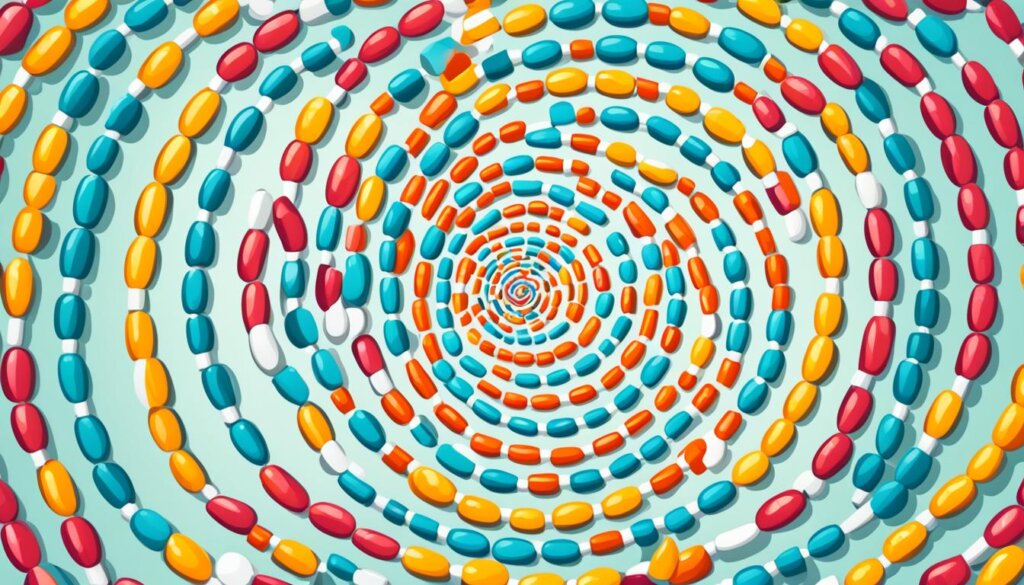
Proton pump inhibitors (PPIs) work better than H2 blockers at treating GERD. They can heal the esophageal lining most of the time. Antacids, H2 blockers, and PPIs might cause diarrhea, constipation, headaches, or upset stomach. Taking PPIs too long can increase the risk of getting a C. diff infection.
“Medications like proton pump inhibitors (PPIs) and histamine 2 blockers can be very effective in managing GERD symptoms, but it’s important to use them cautiously and under the guidance of a healthcare provider.”
GERD Surgery and Procedures
If meds and lifestyle changes don’t work for GERD, surgery might help. There are many surgeries to fix GERD and ease symptoms.
Fundoplication
Fundoplication is a common surgery for GERD. It wraps the stomach’s top around the lower esophageal sphincter to strengthen it and stop reflux. The Nissen fundoplication is the top choice. It uses laparoscopic techniques for less pain, shorter stays, and quick recovery.
LINX Device
The LINX Reflux Management System is another option. It’s a magnetic bead ring implanted around the lower esophageal sphincter. The magnets keep the stomach and esophagus closed to stop acid reflux, but let food go through. This method is done minimally and isn’t for big hiatal hernias.
TIF Procedure
The TIF procedure is a new, incision-free way to treat GERD. It makes a partial wrap around the esophagus with fasteners to tighten the lower esophageal sphincter. Done through the mouth with an endoscope, it means no cuts. Recovery is faster than traditional surgery.
These surgeries and procedures offer lasting relief for GERD symptoms that meds and lifestyle changes can’t fix. NYU Langone, Mount Sinai, and the Society of American Gastrointestinal and Endoscopic give more info on these treatments.
Managing GERD Long-Term
For many, living with gastroesophageal reflux disease (GERD) means managing it for life. GERD affects about 19 million people in the US, with up to one-third of adults having it. To keep symptoms under control and prevent problems, it’s key to eat right, follow dietary advice, and take your meds as told.
It’s also important to see your doctor regularly to check how well your treatment is working and adjust it if needed. Severe GERD is more common in men, older people, and those of white race. Luckily, drugs like pantoprazole help treat GERD in older adults.
If you have recurring GERD, you might need to make lifestyle changes and use long-term strategies. Losing weight if you’re overweight can help a lot. Drugs like H2 blockers and PPIs can also help by reducing acid in your stomach. If these steps don’t work, surgery like Nissen fundoplication might be an option.
Working with a healthcare provider and following a detailed plan can help prevent GERD symptoms from coming back and reduce the risk of complications.
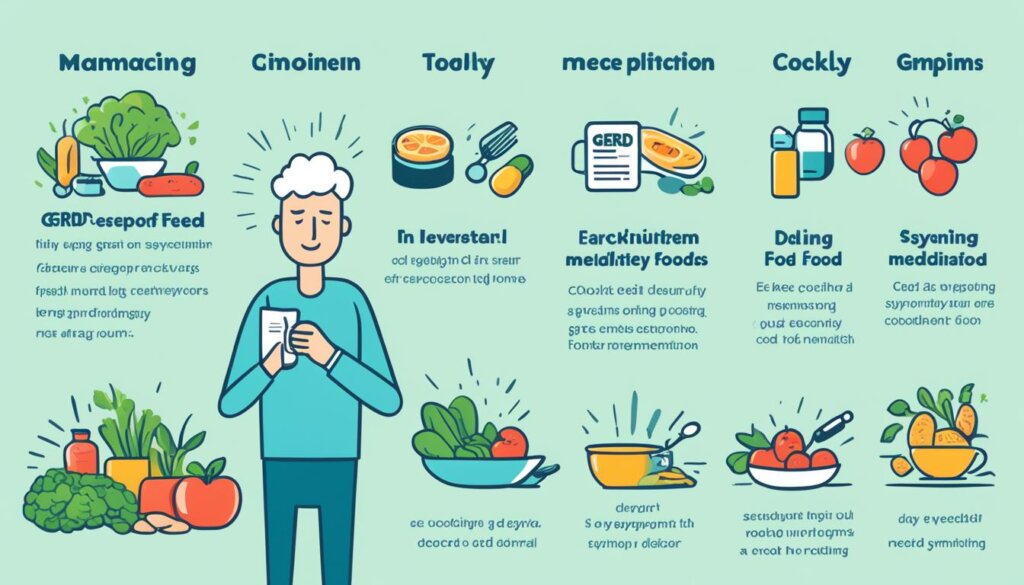
“Effective long-term management of GERD requires a multifaceted approach, including lifestyle modifications, medication, and, in some cases, surgical intervention.”
Even though managing GERD is a long process, there are many treatments and ways to prevent it. These can help people with GERD live comfortably and healthily.
GERD in Children and Infants
Gastroesophageal Reflux Disease (GERD) affects not just adults but also children and infants. It can be different in kids, but it’s serious if not treated.
In babies, GER is common because they drink liquids and lie down a lot. If it’s bad, it can turn into GERD, making it hard for babies to eat and grow. Babies with GERD might cough, breathe noisily, or vomit. They might also not gain weight, have trouble eating, or show signs of dehydration.
Regurgitation is common in babies but less so by one year. But, some babies show signs that mean they have GERD.
Treating GERD in children and acid reflux in babies might mean changing their diet, stopping smoking, and keeping them upright after feeding. Doctors might also give them medicine to lessen stomach acid. Surgery is rare, but most babies grow out of it by 18 months.
Don’t overfeed babies with GERD to avoid making things worse. Feed them every 2 to 4 hours during the day and as needed at night. The thickened formula can help too. Make sure they sleep safely, on their backs in a crib with no pillows.
Signs that mean you should see a doctor fast include losing weight, seeing blood in vomit, trouble breathing, fever, dehydration signs, crying a lot, vomiting a lot, or feeling very tired.
Condition | Prevalence |
|---|---|
Regurgitation in healthy infants | 40-65% in the first year, decreasing to 1% by one year of age |
GERD diagnosis in infants | Approximately 1 in 300 infants |
GERD in children with a history of esophageal atresia, neurologic impairment, hiatal hernia, and other conditions | Higher prevalence |
As babies grow and eat solid foods, they usually have less GER. But, GERD can be hard to fix after the first year. Seeing a pediatric gastroenterologist is key for the right tests and treatment.
“GERD in infants can result in significant discomfort and impact their growth and development. Prompt recognition and management of the condition is crucial to ensure the best outcomes for these young patients.”
GERD Diet and Trigger Foods
If you have gastroesophageal reflux disease (GERD), what you eat is key to feeling better. Some foods can make GERD worse by relaxing the muscles at the bottom of your esophagus or irritating your esophagus lining. Knowing which foods are safe and which to avoid can help ease your symptoms and protect your esophagus.
Foods that often trigger GERD include fatty or fried foods, citrus fruits, tomatoes, chocolate, coffee, alcohol, and peppermint. These items can make the muscles at the bottom of your esophagus relax. This lets stomach acid flow back up into your esophagus.
On the other hand, eating green beans, broccoli, and leafy greens can lower your risk of acid reflux. Foods like ginger, oatmeal, melons, bananas, apples, pears, lean meats, and egg whites are also good choices.
- Foods like fatty and spicy items, chocolate, and caffeine can make GERD worse.
- Vegetables, ginger, and oatmeal can help control acid reflux.
- Melons, bananas, apples, pears, lean meats, and egg whites are good for GERD sufferers.
Avoiding foods that trigger GERD and eating a diet focused on lean proteins, whole grains, fruits, and vegetables can help. Eating smaller meals more often and skipping late-night snacks can also help.
GERD-Friendly Foods | GERD Trigger Foods |
|---|---|
|
|
Creating a diet plan that suits your GERD needs, along with managing your weight and not overeating, can help control your symptoms. Paying attention to what you eat and how much can be a big step towards managing your GERD.
“Up to one-third of the U.S. population is affected by gastroesophageal reflux disease (GERD), and an estimated one out of five people with GERD experience heartburn or acid regurgitation every week, while two out of five individuals with GERD experience these symptoms at least once a month.”

It’s important to remember that everyone is different. Working with your healthcare provider is key to finding out what foods trigger your GERD and creating a diet plan that’s right for you.
Alternative Therapies for GERD
Some people with Gastroesophageal Reflux Disease (GERD) look for other ways to help besides traditional treatments. They might try herbal remedies, acupuncture, or other mind-body practices. But, there’s not much proof these work well for GERD. Always talk to your doctor before trying new treatments.
Herbal Remedies for GERD
Some herbs might help with GERD symptoms. Ginger could make heartburn less frequent and lower acid levels, says a 2023 review. Licorice root, especially DGL, might ease GERD symptoms by helping with stomach acid, another 2023 review found. But, these herbs might not work for everyone and could affect other medicines you take. Always check with your doctor first.
Acupuncture and GERD
Acupuncture is a traditional Chinese medicine that some people use for GERD. A 2016 study showed it could lessen GERD symptoms. Another study found it helped lower stomach acid and ease acid reflux. Yet, more studies are needed to prove acupuncture works for GERD.
Other Alternative Therapies
Hypnotherapy might help with heartburn, acid reflux, and other GERD symptoms, small studies suggest. Baking soda can help by balancing stomach acid, but it can also cause gas and other issues. Changing your lifestyle, like quitting smoking and wearing loose clothes, can also help prevent acid reflux.
Many alternative therapies for GERD haven’t been proven well, often because the studies are small or not strong. Always talk to your doctor before trying new treatments for GERD.
“While some alternative therapies show promise in managing GERD, it’s crucial to consult with a healthcare professional to ensure the safest and most effective approach for your individual needs.”
Preparing for Your Doctor’s Appointment
When you’re setting up a meeting to talk about gastroesophageal reflux disease (GERD), there are steps to take. Write down your symptoms, note what makes them worse, and list your medicines. It’s also good to bring a friend to help you remember everything.
Be ready to share your health history and get tests to find the right treatment for GERD. You’ll likely have an upper endoscopy to check your esophagus and stomach for reflux signs.
- Write down all GERD symptoms, including when they happen, how bad they are, and how often.
- Make a note of things that make symptoms worse, like certain foods or habits.
- Make a list of all your medicines, including things you buy over the counter or get by prescription.
- Think of questions to ask the doctor, like what you can do on your own, changes to your diet, how losing weight helps, and if you’ll need to take medicine long-term.
Getting ready for your appointment helps your doctor understand your GERD better. This means they can make a treatment plan that works for you.
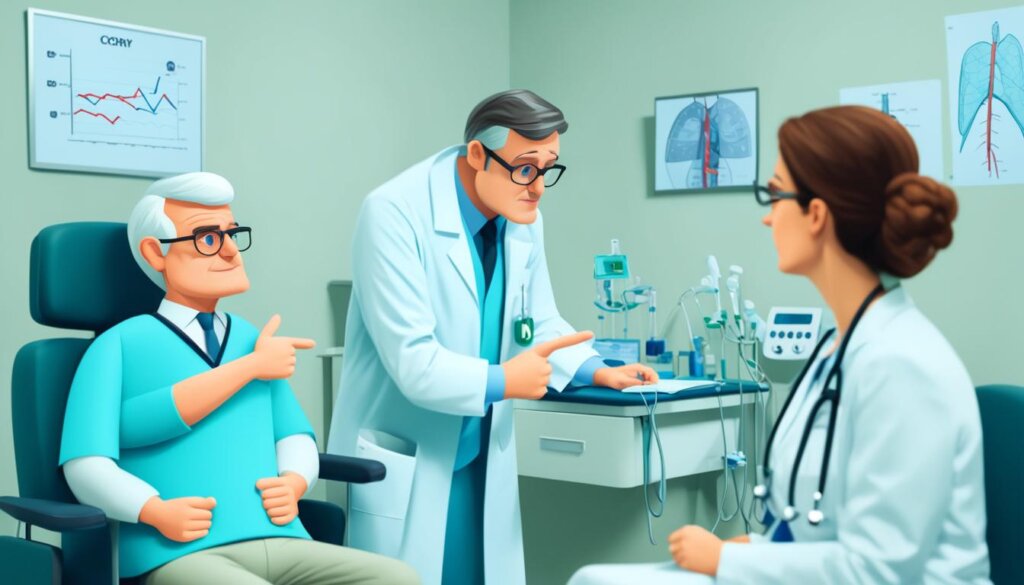
Being active in your GERD care improves talking with your doctor and getting care that fits you. Preparing for your appointment is key to handling this common but serious stomach issue.
Conclusion
Gastroesophageal Reflux Disease (GERD) is a complex condition that needs careful management to avoid long-term problems. It’s important to know the causes, like obesity and hiatal hernia, and the many symptoms, from heartburn to breathing issues.
Changing your lifestyle and taking medicine can help many people with GERD. But some might need surgery, like fundoplication or the LINX® Reflux Management System. Working with a healthcare provider helps create a plan that tackles the real causes of your GERD.
The summary of GERD, key takeaways on GERD, and the importance of managing GERD show how this condition can affect your life if not treated. By acting early, you can boost your health, lower the risk of problems, and live a better life.
FAQ
What is Gastroesophageal Reflux Disease (GERD)?
GERD is a condition where stomach acid flows back into the esophagus. This can cause heartburn and make swallowing hard.
How do heartburn and GERD occur?
Heartburn and GERD happen when the muscle at the top of the stomach relaxes too much. This lets stomach acid flow back into the esophagus. Over time, this can lead to GERD.
What are the common symptoms of GERD?
GERD symptoms include heartburn, feeling like food comes back up, and trouble swallowing. Other signs are hoarseness, coughing, and breathing problems.
What causes GERD and who is at risk?
GERD can be caused by a hiatal hernia or being overweight. Extra weight puts pressure on the stomach, making acid flow back up.
What are the potential complications of untreated GERD?
Untreated GERD can cause inflammation, narrowing of the esophagus, and a condition that may lead to cancer.
How is GERD diagnosed?
Doctors might use tests like endoscopies, pH probes, X-rays, or esophageal manometry to diagnose GERD.
What are the treatment options for GERD?
Treatments include changing your diet and lifestyle. Doctors may also suggest medicines or surgery if needed.
How can GERD be managed long-term?
Managing GERD means eating right, taking your medicine, and seeing your doctor regularly. This helps keep symptoms under control.
How does GERD affect children and infants?
Kids with GERD might vomit a lot or have chest pain. Older kids might have heartburn or breathing problems. Treatment depends on the severity.
What foods and beverages can trigger GERD symptoms?
Foods like fatty foods, citrus fruits, and chocolate can trigger GERD. Eating lean foods and avoiding triggers can help.
Are there any alternative or complementary therapies for GERD?
Some people try herbal remedies or acupuncture for GERD. But, there’s not much proof they work. Always talk to your doctor first.
How can I prepare for a doctor’s appointment to discuss GERD?
Write down your symptoms and any foods that make them worse. List your medicines and think of questions to ask the doctor. Bringing someone with you can be helpful.

